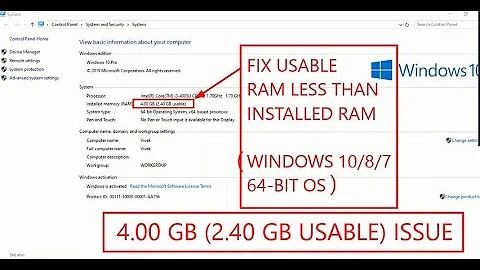12GB of RAM only 8GB is usable on Windows 7 64-bit
Solution 1
Alright so I'm not sure why in the hell this did the trick. But this computer I'm using has had many previous users, so I had like 9 jdks installed, some 64bit some x86. So I figured I may as well get rid of all of the x86 installations because I had reason to believe that netbeans was running one of these x86 jdk installations, (which it was), because I wasn't even getting much over 4gb of ram usage when I was overflowing my heap space while trying to find a bug.
Anyway, long story short, now it shows a straight 12GB of memory installed on the System page of the control panel, no sub-text about how only a certain amount is available. All from uninstalling some JDKs and rebooting....very odd.
The settings on dxdiag are the same as when I checked before as well. But hey, whatever works =D
Thank you for all the suggestions! especially the dxdiag command, I hadn't been aware of that before this.
Solution 2
One solution to your problem:
- Open the Start menu
- Type
msconfig - Press Enter
- Click the
Boottab - Click
Advanced Options - Uncheck
Number of processorsandMaximum memory - Click
OKon both windows - Restart PC
Solution 3
You are correct - no video card I've heard of would be stealing that much RAM. Here are all the possibilities I can think of:
- Faulty RAM sticks - swap out your sticks and put in spare sticks you might have, or borrow some from a friend.
- Bad motherboard - in this case, swapping out for other RAM most likely won't work.
- Bad seating - re-seat your RAM (take them out and then put them back in).
- Motherboard and RAM incompatibility - in this case, swap out your sticks for a different brand of RAM.
If you do swap out, periodically check whether your machine shows all of the RAM available.
Related videos on Youtube
Ethan
Updated on September 18, 2022Comments
-
Ethan over 1 year
I'm running a Dell Studio XPS, with quad core processor, two threads per core, with 12GB of installed RAM. According to Windows, only 7.99GB of that RAM is usable.
The really weird part is, up until two weeks ago I only had 8GB of RAM and then only 3.99GB was usable. So 4GB of RAM is consistently being taken.
I've checked in every screen, under every option in my BIOS and there doesn't seem to be a memory option there at all (that's a damn Dell for you). I've read that a lot of times this can occur because of the video card stealing some RAM for itself.
Is there some way I can check this, other than the BIOS? I have onboard graphics, not a separate card.
I'm running Windows 7 64-bit.
-
Darius almost 12 yearsCan you run dxdiag and see what's the approx. total available memory in the display tab? Also does the first tab show all 12 GB ?
-
100rabh almost 12 yearswhich edition of Windows 7?
-
Oliver Salzburg almost 12 yearsRelated: superuser.com/questions/217200/…
-
Ethan almost 12 yearsWindows 7 Home. And dxdiag shows all 12 gigs on the first page, and then 3571 MB (odd RAM number...) under the Display1 Tab, and the Display2 tab.... So I guess that means my memory is indeed being given up to the graphics card
-
Ethan almost 12 yearsIs there some way that I can redistribute this RAM claimed for video memory besides the bios?
-
-
Darius almost 12 yearsI would still upgrade the BIOS since it's there where you can change the setting of how memory is your video is going to "steal".
-
Casey almost 12 yearsWow...I'm gonna uninstall the JDK now.
-
Ethan almost 12 yearsI've already looked at that, there was no max memory.
-
Thorbjørn Ravn Andersen over 9 yearsMost likely the reboot was more important than the JDK's if you have fiddled with the system settings.
-
Ethan about 8 yearsThe reboot definitely did not do it. There was tons of rebooting going on between all of these steps.




